Sojitz Releases Historical Manga Volume 2 – Dawn of a New Era
– Suzuki & Co. Takes Action for Japan, Iwai & Co. Advances in the Knit and Steel Industries, and Japan Cotton Trading Co. Voyages to India, China, and America –
Oct. 24, 2022
Sojitz Corporation
Sojitz has released the second installment of its historical manga “Sojitz – A General Trading Company; The Pioneers who Paved the Future of Japan” with “Volume 2 – Dawn of a New Era” now available on the Sojitz website.
Sojitz-A General Trading Company “The Pioneers who Paved the Future of Japan Volume 2 – Dawn of a New Era
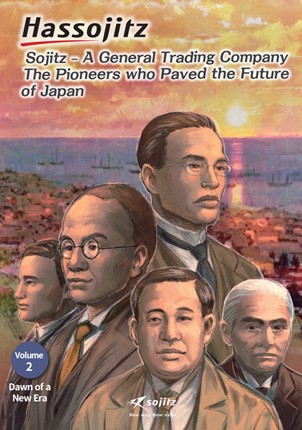
In Volume 2, the Sino-Japanese War ends, and Yahata Steel Works begins operations. Following the Russo-Japanese War, as Japan strove to join the ranks of developed countries, Suzuki & Co., Iwai & Co., and Japan Cotton Trading gradually expanded their businesses overseas, began domestic manufacturing, and further diversified their business. Japan Cotton Trading was committed to realizing independent cotton procurement by Japan, establishing a direct shipping route between Japan’s Kobe and India’s Bombay and expanded procurement sources to India, China, and America. Iwai & Co. embarked on jersey manufacturing, while Suzuki & Co. set up new manufacturing sites in Kitakyushu’s Dairi district, which included sugar refineries, flour mills, beer breweries and shochu sake distilleries. Additionally, Suzuki and Iwai were inspired by the operations of Yahata Steel Works to enter the steel industry.
In the same manner as Volume 1, the new manga will be donated to all public libraries¹in Kobe (founding place of Sojitz’s predecessor companies) and distributed free of charge² at the Eki Soare Seishin Chuo shopping center (Nishi Ward, Kobe), which is operated by Sojitz.
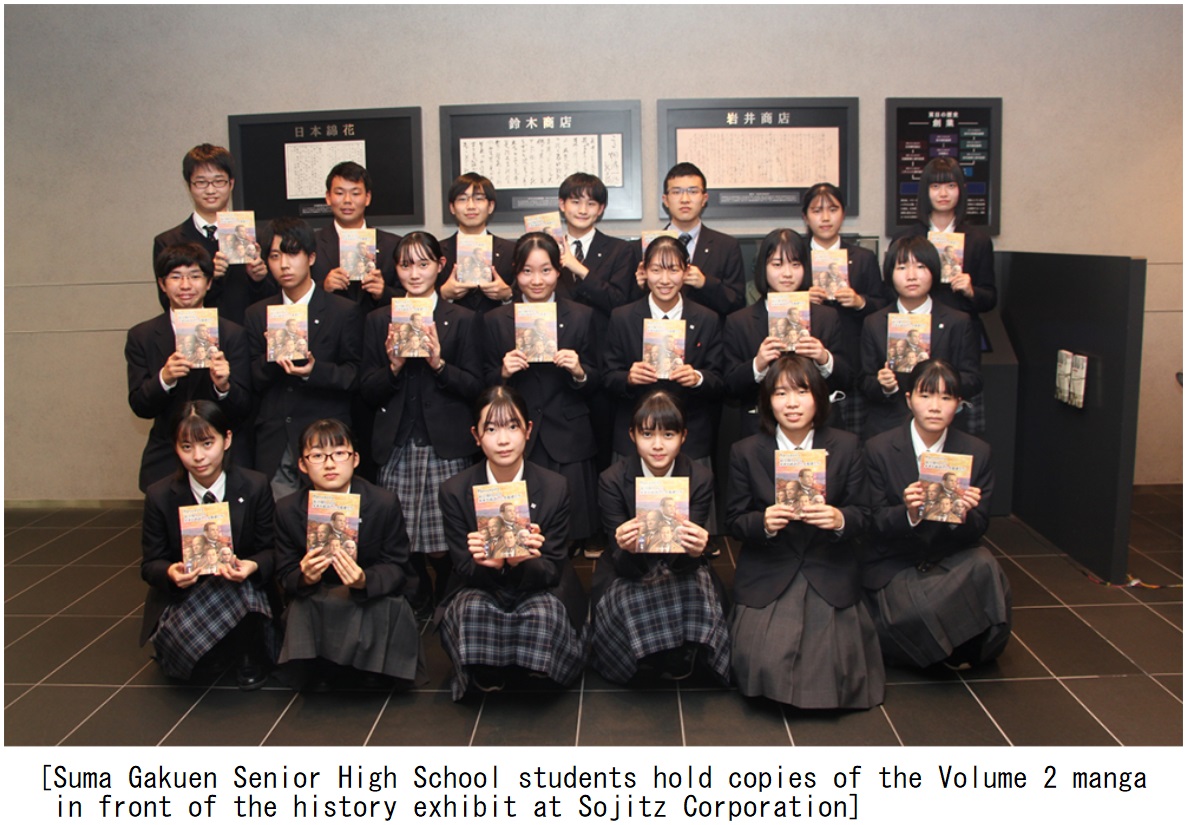
On October 18th, 20 students from Suma Gakuen Senior High School (Suma Ward, Kobe) visited Sojitz as an introduction to modern-day general trading companies. Through the manga, students also learned about Sojitz’s predecessor companies—Suzuki & Co., Iwai & Co., and Japan Cotton Trading—as these businesses evolved from the Port of Kobe to the world and led Japan’s industrial revolution.
*1: Donation recipients include Kobe Children’s Book Forest, 12 libraries in Kobe, and Kobe’s Shinko Tachibana Senior High School, Kobe University, and Wakamatsu cram school (Seishin Chou schools and cram schools within Eki Soare Seishin Chuo shopping center).
*2: Copies of the manga will be available on the 5th floor of Eki Soare Seishin Chuo shopping center in front of the Suzuki & Co. display panel.
[Overview of Volume 2]
Naokichi Kaneko of Suzuki & Co. was dissatisfied with Nihon Seito Corporation’s oligopoly in the market and took action to enter the sugar refinery business through the establishment of Dairi Sugar Refining Co.(currently Kanmon Seito Co., Ltd)in Kitakyushu’s Dairi district. Later, Kaneko faced off with Eiichi Shibusawa. However, Shibusawa complimented Kaneko as a “genius of a businessman” and helped to bring Kaneko’s name to prominence.

Katsujiro Iwai of Iwai & Co. traveled to the West, where he identified the garment industry as a viable business opportunity, going on to establish a jersey manufacturing business (currently Toabo Corporation). When the government-owned Yahata Steel Works began operations, Naokichi Kaneko established Kobe Steel (currently KOBELCO), famously stating that “Suzuki must take action for Japan.” At the same time, Iwai from Iwai & Co. made the decision to the develop the galvanized steel plate business as the oldest steel importing trading company in Japan, going on to establish and serve as president for Osaka Iron Plate Manufacturing (Nisshin Steel Co., Ltd. which become Nippon Steel Corporation).
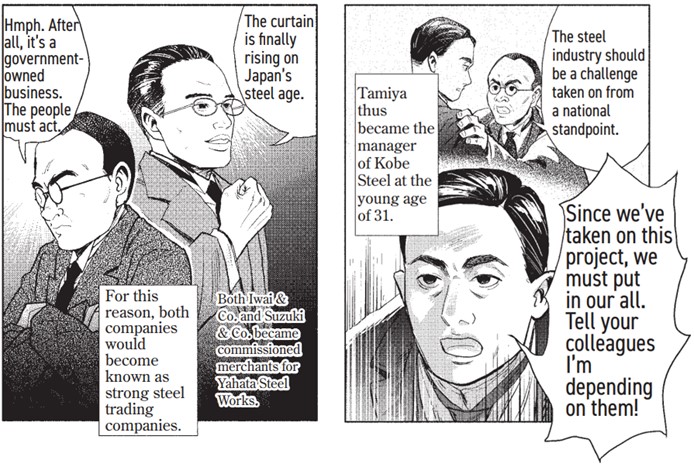
In Kobe, Westerners introduced bread, beef, and other elements of Western food culture. Naokichi Kaneko predicted the Westernization of the Japanese diet and established Dairi Flour Mill (currently NIPPN Corporation) in the Dairi district of Kitakyushu, where Suzuki & Co. had already started other manufacturing businesses. Suzuki & Co. also established Imperial Beer (currently Sapporo Beer) as Kyushu’s first beer factory, and Naokichi Kaneko was at the front lines of sales for the Sakura Beer brand. Suzuki & Co. also established Dairi Sake Brewery (currently Nikka Whiskey Distilling Co., Moji Factory) in the same Dairi district, which became a large industrial park area for Suzuki & Co.
Suzuki & Co. diversified its business into tobacco, salt field development, and life insurance. Suzuki went on to expand its businesses overseas with its own fleet of ships. In the city of Yonezawa, Itsuzo Hata and Seita Kumura started researching artificial silk production, but there would be a long road ahead to commercialization.
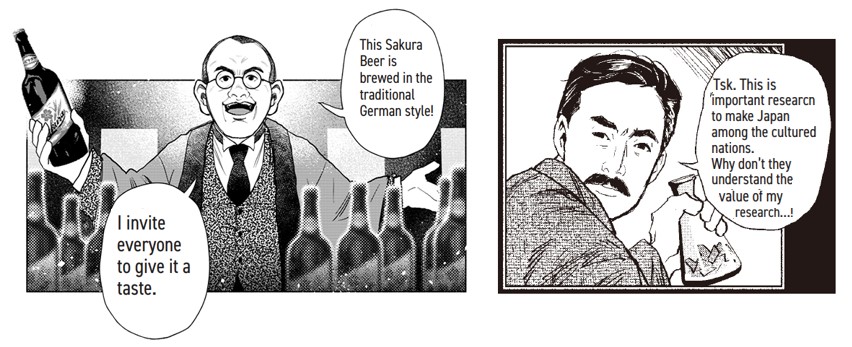
The first president of Japan Cotton Trading, Tsuneki Sano, attempted to procure cotton overseas but was frustrated by Japan’s dependence on foreign ships. Working together with Eiichi Shibusawa and other spinning companies, Japan Cotton Trading was able to open a direct shipping route between Japan and India with Nippon Yusen (currently NYK Line).
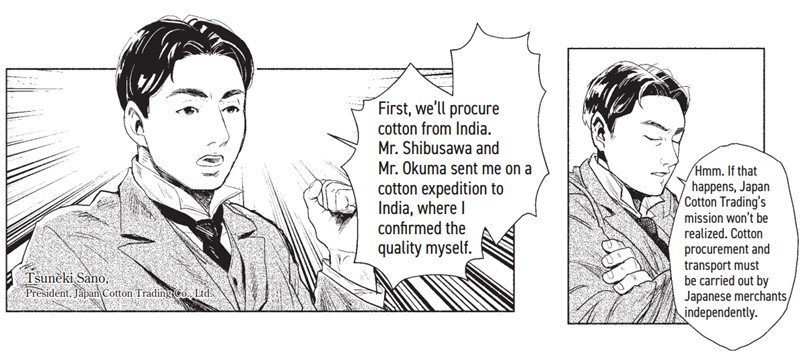
The second president of Japan Cotton Trading Company was Ichibe Tanaka. Tanaka made the decision to send 19-year-old Matazo Kita, who was in in his second year at the company, to Bombay, India. Kita would later go on an expedition to China. Kita not only established multiple cotton procurement sites in China, but also focused on the importance of China’s market and proposed the establishment of an office in Shanghai. Kita also dispatched employees from Japan to America, which was the largest cotton producer in the world at the time.
Japan Cotton Trading was a top trader for major cotton producers such as India, China, and the U.S. At the time, the spinning industry was said to be 50% of Japan’s industry, and Japan Cotton Trading supported the spinning industry through procurement of raw materials.
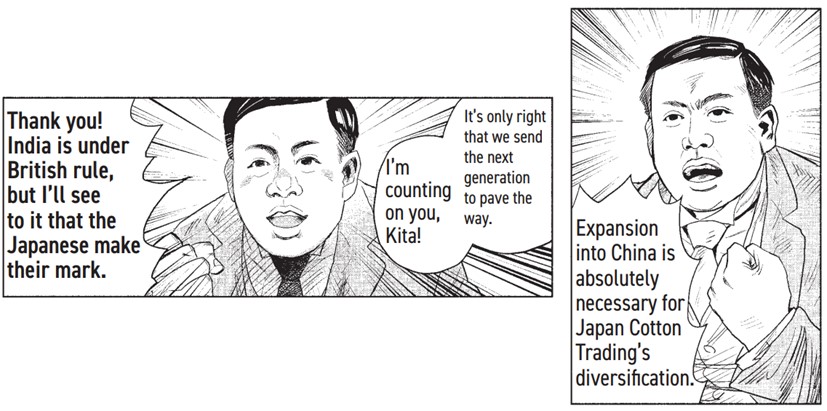
Volume 3 will open with the transition to the Taisho Era when Suzuki & Co., Iwai & Co., and Japan Cotton Trading make great advances following World War I.
[Comments from actor Keiko Takeshita]
Actor Keiko Takeshita, who serves as ambassador to Kobe and honorary director of Kobe Children’s Book Forest, gave an address at the donation ceremony for the new manga held in Kobe. “Without Sojitz’s three predecessor companies, modern-day Japan would not exist. I hope that the youth who will shoulder Japan’s future will learn from these historical figures who were deeply dedicated to their country, society, and families,” she said. Additionally, Keiko Takeshita shared that she hopes that the manga will inspire young children during this challenging pandemic time. “I hope this manga can illustrate how Japan’s early pioneers established a place for themselves in their respective companies while working their hardest on projects of a national scale. It would be wonderful if this manga could be a source of inspiration for children to pursue their dreams with true dedication.”
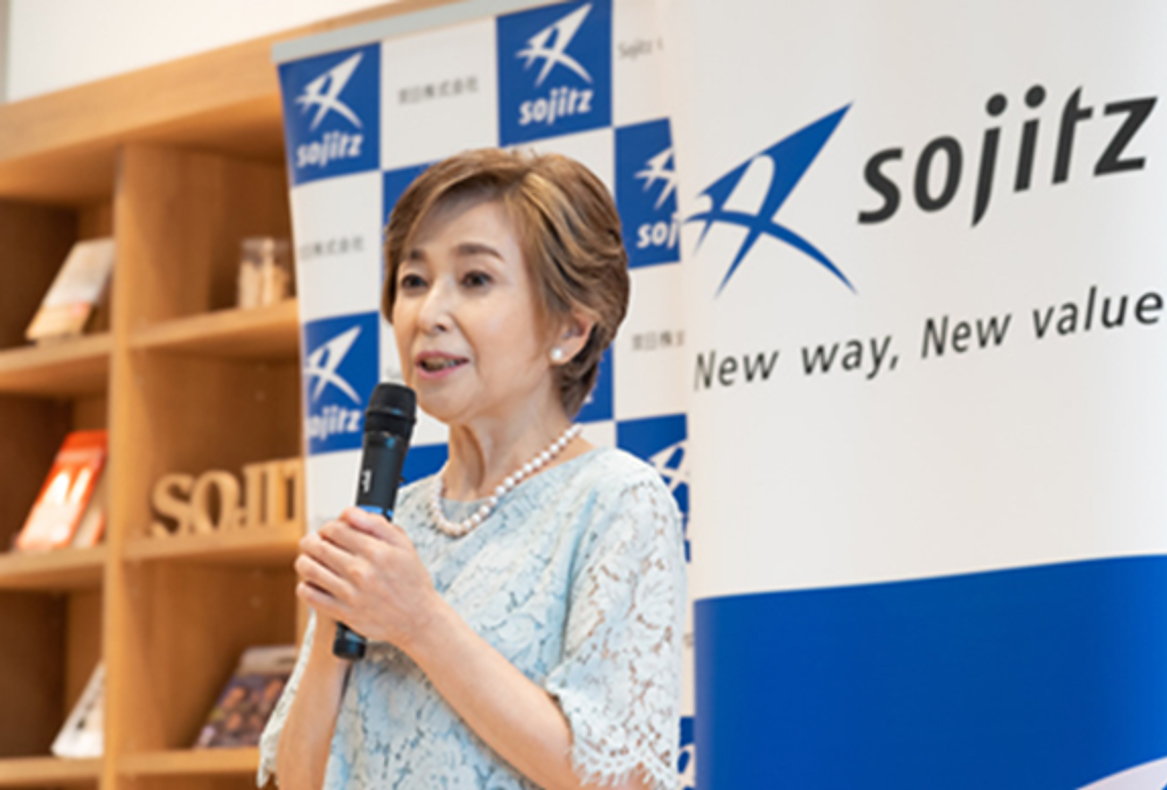
[Keiko Takeshita, Honorary Director of Kobe Children’s Book Forest,
at the donation ceremony in Kobe on August 1st]
Sojitz will strive to create a future of prosperity that carries on the mission of its predecessors.
[Related Information]
[Related TOPICS]
◆ “Unraveling Sojitz’s DNA: Introducing Sojitz’s History as a General Trading Company through Manga “The Pioneers who Paved the Future of Japan” Volume I – The Founding.” Sojitz Corp. TOPICS, 16 June 2022.
◆ “Sojitz Donates History Manga to Kobe Children’s Book Forest and Kobe City Libraries.” Sojitz Corp. TOPICS, 1 August 2022.
[For questions, contact:]
Sojitz Corporation Public Relations Dept. +81-3-6871-3404
